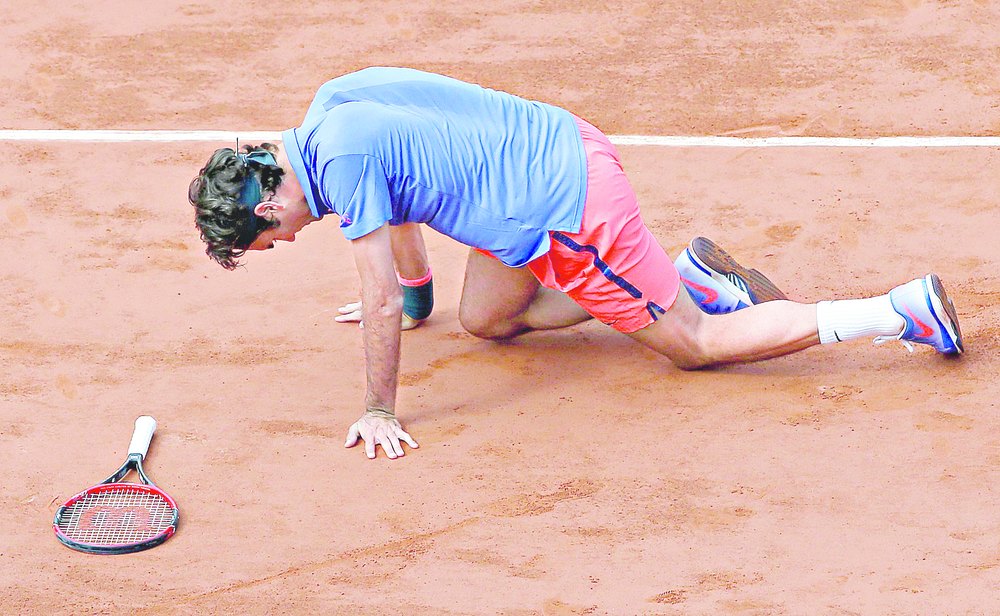
Paris: Stumbling on his way to the net, Roger Federer dropped his racket and fell to his knees on the red clay. Hardly the sort of grace and precision the world has come to expect from the 17-time Grand Slam champion.
There were other unusual sights in Federer's 6-4, 6-3, 7-6 (4) loss in the French Open quarter finals Tuesday against his pal and Swiss Davis Cup teammate Stan Wawrinka.
"I made 30-something errors. He, maybe, made one," said Federer, exaggerating a bit. Rarely injured and appearing in a 62nd consecutive major, Federer received treatment on his right hand from a trainer during a second-set tiebreaker. For years and years, a dominant and confident force in tennis, Federer slumped in his changeover chair, head bowed, after falling behind two sets to none.
So long superior to the younger Wawrinka, Federer was defeated for only the third time in their 19 head-to-head matches, and for the first time in five meetings at Grand Slam tournaments.
"I tried many things. One of them was trying to put (the ball) up high. Another one was trying to chip it shorter. Another one was trying to hit through the wind," Federer said. "Obviously I was not going to leave the French Open without having tried everything out there."
During the eight French Opens from 2005 to 2012, Federer reached at least the semi-finals seven times, including winning the 2009 championship to complete a career Grand Slam. But this is now the third year in a row that he has exited Roland Garros in the quarter finals or earlier.
Give Wawrinka credit. Powering the ball from the baseline in Court Suzanne Lenglen on a windy day, he produced groundstrokes that cut through gusts topping 30 mph (50 kph).
Late in the third set of Federer's loss, he missed a backhand that got caught in the wind and let out a guttural "Aaaaah! He never managed to consistently find the range on his shots, and Wawrinka put together a 43-28 edge in winners.
Wawrinka also managed to break Federer's serve three times, while saving all four break points he faced. All of those chances for Federer came in the first set.
As well as Wawrinka played, he probably would have been just fine without the point conceded by Federer that made it 4-3 for the eventual winner after a disputed call in the tiebreaker.
"I played my best match in a Grand Slam tournament," the eighth-seeded Wawrinka said, quite a statement considering he won the championship at the 2014 Australian Open, "and my best match on clay."
This is his 11th appearance at Roland Garros, equaling the most in the professional era, which began in 1968, for a man getting to his first semifinal in Paris.
"We (knew) he can do this," Federer said. "It's just nice for him now, even talking for him, to string it together on a big occasion like this at the French, where I always thought he'd have his best chance to do well."
Wawrinka next faces No. 14 Jo-Wilfried Tsonga, whose match against Japan's Kei Nishikori was interrupted for about 40 minutes after the piece of metal hit a barrier and a piece of equipment on its way down, slowing its fall before tumbling onto packed rows of spectators. French Open organisers said none of the injuries was serious.
Tsonga regained his composure just in time to head off a stirring fightback from Japanese fifth seed Kei Nishikori, winning 6-1, 6-4, 4-6, 3-6, 6-3.
Tsonga, a semi-finalist at Roland Garros in 2013, relied on his booming forehand to unsettle the US Open runner-up, who only got into his groove late in the second set after the interruption.
One women's semifinal was set Tuesday: No. 7 Ana Ivanovic of Serbia against No. 13 Lucie Safarova of Russia.
Safarova, who beat defending champion Maria Sharapova in the fourth round, beat Garbine Muguruza 7-6 (3), 6-3 to reach the second major semifinal of her career.
Ivanovic reached her first Grand Slam semifinal since winning the 2008 French Open, eliminating 20-year-old Elina Svitolina of Ukraine 6-3, 6-2. (Agencies)










